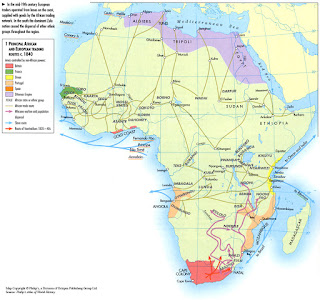In Chapter One of Tarzan Of The Apes we learn in 1888, John Clayton (Tarzan's father), was commissioned to make a peculiarly delicate investigation of conditions in a British west coast African colony. From this colony of simple native inhabitants, another European power was known to be recruiting soldiers for its native army, which is used solely for the forcible collection of rubber and ivory from the savage tribes along the Congo and Aruwimi Rivers.
 |
| Pablo Marcos & Oscar Gonzalez |
Burroughs does not openly state who that European power was, but from history we learn it was the Belgian Congo. In 'A Jungle Joke', a short story in Jungle Tales Of Tarzan, the author gives us an implication. "Formerly they (the tribe of Mbonga) had dwelt in the Belgian Congo until the cruelties of their heartless oppressors had driven them to seek the safety of unexplored solitudes beyond the boundaries of Leopold's domain." Once one exits Tarzan Of The Apes and checks African history, it will be discovered that King Leopold II of Belgium, did indeed put together a native army that forced natives to collect rubber and ivory around this time period.
The West African coastal colony, Clayton was assigned to, was not mentioned by name either. By using Burroughs' provided information it can be easily deducted. In Jane's letter to Hazel Strong, in Chapter Eighteen of Tarzan Of The Apes, the jungle lord's cousin, William Cecil, has estimated their marooned position to be about ten degrees South Latitude. This would be in Portuguese Angola, at a point north of the town of Lobito and south of the point of Luanda.
Since there is nothing to indicate the Arrow was off course at the time, there is no reason to doubt William Cecil's judgment. Also, when Professor Porter and Samuel T. Philander became lost, in Chapter Thirteen, it is stated they were headed for Cape Town which lay fifteen hundred miles to the south.
From these passages, we know John and Alice's rendezvous lay beyond Portuguese Angola. The only British possession that far south with west coastal shores is in Cape Colony (South Africa) and its annex, Walvis Bay.
 |
| Russ Manning |
In 1888 most of Cape Colony's affairs were centered on its east coast. The Witwatersrand gold field was discovered in 1886, and prospectors rushed into the Transvaal from the British Colonies and elsewhere. Soon growing tensions mounted between the Boers (Dutchmen) and the British, which would eventually lead to the Second Boer War (1899-1902).
 |
| Pablo Marcos & Oscar Gonzalez |
Without a doubt, John and Alice were headed for Walvis Bay, which lies twenty-three degrees south of the equator and is less than four hundred square miles. This whaling port was the only large harbor on the Southwest African coast. It was first visited by the Portuguese explorer Bartolomeu Dias in 1486 but was not exploited for a long time because of the lack of freshwater inland.
From the late seventh century, whales were hunted off the coast of South West Africa, and from the 1830s, traders, missionaries, and collectors of guano (seabird droppings) used Walvis Bay increasingly. In the 1840s there was a rush for guano on a number of off-shore islands. This rush led to British sovereignty over twelve of the islands in the 1860s, and they were annexed to the Cape Colony in 1874.
 |
| 1840 Africa |
By that time traders and missionaries at Walvis Bay had long asked for British protection, and in 1875 the Cape parliament sent a commissioner north of the Orange River. He recommended that the whole coast be annexed, but the British government would only authorize the annexation of Walvis Bay (1878), which was in turn incorporated into the Cape in 1884. Three weeks later Germany proclaimed a protectorate over the remainder of the coast of South West Africa.
 |
| Joe Kubert |
Walvis Bay was the closest coastal location Clayton could get to the Belgian Congo, and remain on British soil. Since the whaling port was an international docking point, Clayton would have a means of picking up international gossip. Thus, the British hoped to pick up valuable information from passing sailors that would help them keep tabs on Belgium's King Leopold II.
Many Tarzan chronologists believe that Edgar Rice Burroughs deliberately falsified the Greystoke's May 1888 sailing date in a move to protect their true identities. In an effort to keep Korak the born son of Tarzan and Jane, these chronologists through large amounts of research have pushed the Greystoke's sailing date back sixteen years to 1872. In the Tarzan chronology world, this is known as 'The Pushback Theory.' Are John and Alice still headed to Walvis Bay in this alternative dating?
 |
| Burne Hogarth |
Britain was the most important trading power in West Africa during the first half of the nineteenth century. France was a distant second. As the exports of slaves declined, a new trade-in vegetable oils arose. The major customer was Britain, whose imports rose from one hundred tons in 1807 to over thirty-one thousand tons in 1854.
 |
| Pablo Marcos & Oscar Gonzalez |
Britain's raw wool imports had increased eight hundred percent between 1830 and 1870, and the Cape Colony was second only to Australia as a source. By 1870 it provided twelve percent of Britain's raw wool imports, exceeding the value of Britain's palm oil imports from West Central Africa.
 |
| Pablo Marcos & Oscar Gonzalez |
From mid-century Britain and France began to be more aggressive in their dealings with African societies. This was particularly true in the 1870s when the declining profitability of the vegetable oil trade led to an increase in disputes between African and European merchant groups.
 |
| Burne Hogarth |
Around 1865 King Leopold II, acting independently of the Belgium government, began to make his presence felt in the Congo territories. Slavery, at this time, had been abolished by most European powers. Leopold claimed his presence in the area was to stop Arabs from capturing and transporting slaves from the Congo to East Africa.
Since the competition was so stiff between the Europeans, at this time, Britain and France suspected Leopold II of having hidden attention. Those intentions were to profit himself. By the 1870s it was generally known about Leopold's forcible rubber and ivory collecting, but it was not until the later 1880's that it became world famous. Thus, the Greystokes' setting sail in May 1872 would not change Clayton's mission in the least.
 |
| Pablo Marcos & Oscar Gonzalez |
It is doubtful that Cape Colony was John and Alice's destination. It is true that in 1872 the Cape was granted self-government, but it is unlikely that Britain would entrust a young inexperienced man to an overly high position. Not to mention the fact that Clayton was a spy. Therefore, the government would not want to over-expose him, plus the Brit needed freedom of movement to collect intel.
At this time period, Cape Colony's affairs were again centered on its east coast. Around 1867, a Boar family discovered diamonds in Griqualand. This was an area claimed by both the Orange Free State and Great Britain. In 1871, the British invaded and seized the area. Six years later, the British annexed the territory which brought on the First Boer War (1880-1881).
 |
| Rick Veitch |
Although Walvis Bay did not become part of Cape Colony until 1874, it had been under British sovereignty since the 1860s. Since traders and missionaries were seeking British protection at this time, Walvis Bay was most probable for Clayton's intended post. Young Greystoke's public task, most likely, would have been to investigate the worth of Walvis Bay, as a British annex, while secretly collecting information on Leopold's activities.
 |
| Zdenek Burian |
ABOUT THE AUTHOR
James Michael Moody is a lifelong fan and collector of Edger Rice Burroughs. Over the past forty-five years, Moody has contributed over two hundred articles to various ERB-related fanzines. He also manages an unauthorized Tarzan blog titled Greystoke Chronologist: James Michael Moody. There, the researcher chronologies the Tarzan books starting in May 1872 (known as the pushback theory) instead of the more accepted date, May 1888.
James Michael Moody also authorizes the action-packed Sci-Fi fantasy adventure Unium series. Pioneers On Unium, published December 31, 2019, Exiled On Unium, published August 25, 2022, and Swordsman On Unium, published on July 15, 2024.







No comments:
Post a Comment